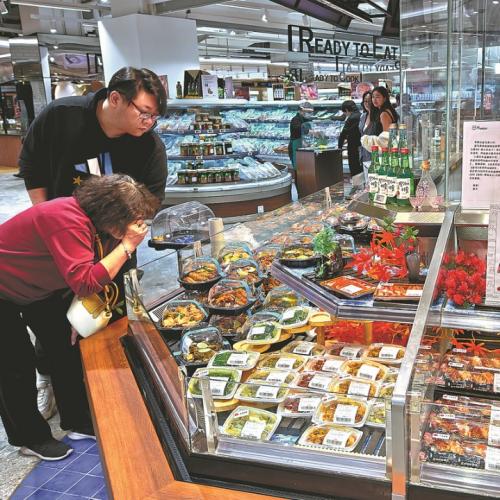



The price war for durian cakes and similar market phenomena that have now spread to a variety of categories and retail operators indicate that Chinese consumers are becoming more rational and cost-conscious, and retailers increasingly need to make more improvements in supply chain management and store experiences to meet new market needs, said industry experts.
The flurry of pricing competition began after prices for durian cakes sold by Freshippo — the grocery and fresh goods retail chain under Alibaba Group — and US retailer Sam's Club — were slashed in the second half of 2023. The pricing tug-of-war not only lowered the popular sweet snack down to 79 yuan ($11) on Freshippo and 85 yuan at Sam's Club, but also was seen among a broad range of consumer products, with both online and offline retailers joining the fray.
For example, a 950-milliliter carton of fresh milk can now be bought for under 10 yuan in Shanghai versus at least 13 yuan a few years ago, said the Shanghai Observer.
The price war came amid milder economic growth and against the backdrop that Chinese consumers are becoming more rational and cost-sensitive, said Yu Jian, managing director of Kantar Worldpanel in China.
"The changes in price reflect that retailers can no longer base their development on the expansion of scale, but need to achieve extreme efficiency in supply chains and operations. Only by doing so can various retailers survive in the fiercely competitive market and continue to expand — and further form unique competitive strengths with their special positioning," Yu said.
Yu added that after three decades of consumption upgrades, Chinese consumers increasingly care more about cost-effectiveness than just bargain basement prices, as they do not want to sacrifice their quality of life in order to save a few yuan. In the meantime, sufficient product supply and growing transparency in product information have strengthened consumers' say in pricing.
From the retailers' perspective, they have taken differentiated measures to attract and retain consumers, including producing cost-effective products and smaller packages, as well as choosing strategic locations and the provision of sufficient fresh foods and daily necessities, said Shao Juan, category director with Mintel Reports China.
Starting in October, Freshippo launched all-round supply chain optimization to lower its product prices, and the optimization of its supply chain will continue this year to allow more consumers to enjoy affordable high-quality products, said the retail chain which currently operates over 350 stores in 28 Chinese cities.
Likewise, German retailer Aldi hopes to secure steady growth in China by meeting local consumer needs with localized products and various private labels.
"Chinese consumers have become more rational. They are very concerned about where their money is spent, value price, and not lowering their requirements for quality. This is an opportunity for Aldi," said Roman Rasinger, managing director of China with Aldi.
"Globally, middle-income groups are unanimously becoming more rational in their consumption habits based on expectations of shrinking income in the future," said Hou Yi, CEO of Freshippo.
The Chinese retail market experienced a period of recovery last year, and the sector is expected to continue on a course of resumption this year, said Yu.
"There will be new opportunities for retailers to explore such innovative retail business models amid the integration of online channels with brick-and-mortar stores, and further involvement of digitalization. By seizing on such new trends, retail operators will be able to gain an edge in the fierce competition of the retail market," Yu said.
For physical stores, there is also a lot to do to improve the in-store experience to attract more consumers, said Shao.
If you have any problems with this article, please contact us at app@chinadaily.com.cn and we'll immediately get back to you.